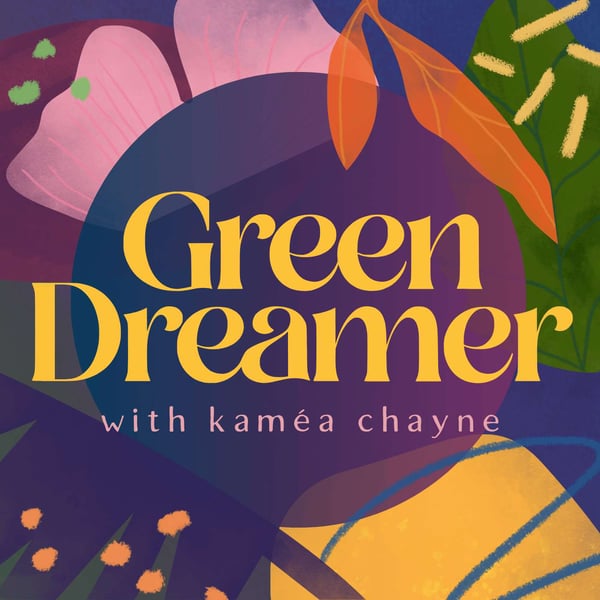124) Everything we need to know about microplastic pollution right now with Rachael Miller
Green Dreamer: Seeding change towards collective healing, sustainability, regeneration
kaméa chayne
4.9 • 661 Ratings
🗓️ 28 March 2019
⏱️ 43 minutes
🧾️ Download transcript
Summary
What do we need to know about how microplastic pollution impacts our health and the health of our natural ecosystems? Why can natural microfibers shed from our clothes also be problematic when they wash down the drain?
Sharing her wisdom here is Rachael Miller, the Co-Founder of Rozalia Project and the Founder of Cora Ball, a solution that keeps microplastics from our clothing from washing down the drain. Let's dive in!
*Become a patron for bonus episodes, access to our Green Dreamer Network, and more: www.greendreamer.com/support
HIGHLIGHTS
[9:23] Rachael explains how our clothing and textiles break apart and shed microfibers.
[11:42] Why our clothing made from natural fibers (and not just synthetics) can also be problematic.
[15:47] Rachael talks about how her team designed Cora Ball through biomimicry.
[25:16] Rachael: "Everyone who wears and washes clothes is part of this problem... And everyone who wears and washes clothes can be a part of this solution."
[27:41] Rachael: "Unlike microbeads, there is no one solution here."
[29:41] Kaméa: "How do you think we can move towards a more preventive system?"
Thanks for bringing your light! Find the full show notes with links and resources at www.greendreamer.com/124, subscribe to our free weekly newsletter, and share your #1 takeaway from the episode tagging our featured guest and me @KameaChayne to spread the light and to let us know you're tuning in!
*Become a patron for bonus episodes, access to our Green Dreamer Network, and more: www.greendreamer.com/support
Transcript
Click on a timestamp to play from that location
| 0:00.0 | Hey there, this is your host, Kamea. I hope you had a restful holiday season and that your start to this |
| 0:07.3 | new year has been all of the things that you might need during this time. As we move deeper into |
| 0:13.5 | 2025, first of all, I'm so excited to share the many conversations we already have in the pipeline |
| 0:19.4 | for you this season, so definitely stay tuned |
| 0:22.3 | and make sure you're subscribed to my Substack newsletter, which you can find at camilla.substack.com. |
| 0:29.9 | And I also just want to share that our call for your direct support continues as well, |
| 0:34.4 | because independent media is more important than ever and every contribution |
| 0:39.0 | no matter how small or large really helps us out so much so if you haven't already we invite you |
| 0:45.2 | to join our patreon or substack membership or contribute a gift of any amount at greendreamer.com |
| 0:51.8 | slash support if you need a planner for the new year, you can also |
| 0:56.1 | check out our fundraising green dreamer planners at greendreamer.com slash shop. Thank you so, so much |
| 1:03.4 | for whatever forms of support you're able to share with us. For now, enjoy the show. |
| 1:10.3 | Lots of littles make a big. |
| 1:11.8 | That is the key for me. |
| 1:13.9 | It's just to remember that lots of little problems make a big problem, but lots of little |
| 1:19.7 | efforts make a big positive impact. |
| 1:25.3 | What do we need to know about microplastic pollution and how it impacts our health and the health of our natural ecosystems? |
| 1:33.7 | Why do we need to be wary not only of microplastic fibers shedding from our clothing and textiles, |
| 1:40.0 | but also the natural fibers that shed from our clothes as well? |
| 1:47.0 | That's just the tip of the iceberg of what you'll hear today. I'd like to take a moment to thank our sponsor, Arbor Tees, |
| 1:50.0 | for helping to make our work possible. |
| 1:52.0 | Arbor Tees is a small family-owned organic tea company |
... |
Please login to see the full transcript.
Disclaimer: The podcast and artwork embedded on this page are from kaméa chayne, and are the property of its owner and not affiliated with or endorsed by Tapesearch.
Generated transcripts are the property of kaméa chayne and are distributed freely under the Fair Use doctrine. Transcripts generated by Tapesearch are not guaranteed to be accurate.
Copyright © Tapesearch 2025.

